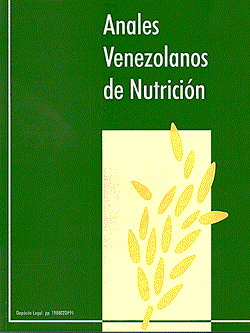La investigación alimentaria en Venezuela. Perspectivas y desafíos
Palabras clave:
Investigación Alimentaria, Evaluación Dietética, Perspectivas, Desafíos, Venezuela, Food Research, Dietary Assessment, Perspectives, ChallengesResumen
La evaluación dietética es una de las herramientas más importantes de la epidemiología nutricional, su práctica continúa siendo un reto para los profesionales de la Nutrición, que actualmente se enfrentan a cambios en el perfil epidemiológico de la población, avances científicos y tecnológicos, escasez de recursos y desigualdades sociales. Los estudios dietéticos, como cualquier otro tipo de investigación evaluativa, ven comprometidas su validez y confiabilidad ante debilidades técnicas y metodológicas que deben ser atendidas, durante el diseño y la ejecución. Venezuela, al igual que el resto de los países latinoamericanos, tiene una larga historia de investigación alimentaria, encontrando estudios que difieren en objetivos, tamaño de la muestra, tipo de muestreo, técnicas aplicadas, tratamiento estadístico, análisis y uso de la información. Actualmente, es indiscutible la necesidad de acercarse al consumo real de alimentos y nutrientes por parte de la población venezolana, contar con una línea base es indispensable para la formulación, implementación y evaluación de estrategias de intervención eficaces para el alcance de mayores niveles de salud nutricional y la prevención de enfermedades, que garanticen una vida activa y productiva para la población. Las nuevas exigencias y retos exhortan a la revisión permanente de conceptos, enfoques y protocolos de evaluación dietética. La invitación es a transitar por el fascinante campo de la investigación alimentaria y tomar lo mejor de los dos mundos: la rigurosidad científica que siempre se debió mantener y las oportunidades y desafíos que caracterizan a los nuevos tiempos.
Dietary assessment is one of the most important tools in nutritional epidemiology; its practice continues to be a challenge for nutrition professionals, who are currently facing changes in the epidemiological profile of the population, scientific and technological advances, scarcity of resources and social inequalities. Dietary studies, like any other type of evaluative research, have their validity and reliability compromised in the face of technical and methodological weaknesses that must be addressed during design and execution. Venezuela, like the rest of the Latin American countries, has a long history of food research, finding studies that differ in objectives, sample size, type of sampling, applied techniques, statistical treatment, analysis and use of information. Currently, the need to approach the real consumption of food and nutrients by the Venezuelan population is indisputable; having a baseline is essential for the formulation, implementation and evaluation of effective intervention strategies to achieve higher levels of nutritional health and the prevention of diseases that guarantee an active and productive life for the population. The new demands and challenges call for the permanent revision of concepts, approaches and protocols for dietary assessment. The invitation is to travel through the fascinating field of food research and take the best of both worlds: the scientific rigor that always had to be maintained and the opportunities and challenges that characterize the new times.
Descargas
Descargas
Cómo citar
Número
Sección
Licencia

Este obra está bajo una licencia de Creative Commons Reconocimiento-NoComercial 4.0 Internacional
Usted es libre de:
Compartir — copiar y redistribuir el material en cualquier medio o formato
Adaptar — remezclar, transformar y construir a partir del material
La licenciante no puede revocar estas libertades en tanto usted siga los términos de la licencia
Bajo los siguientes términos:
Atribución — Usted debe dar crédito de manera adecuada, brindar un enlace a la licencia, e indicar si se han realizado cambios. Puede hacerlo en cualquier forma razonable, pero no de forma tal que sugiera que usted o su uso tienen el apoyo de la licenciante.
NoComercial — Usted no puede hacer uso del material con propósitos comerciales.
No hay restricciones adicionales — No puede aplicar términos legales ni medidas tecnológicas que restrinjan legalmente a otras a hacer cualquier uso permitido por la licencia.


